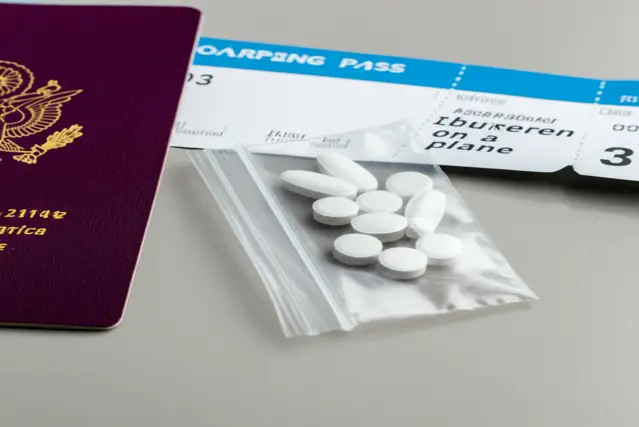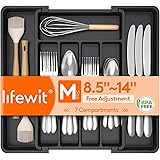Planning a trip and wondering if you can pack your trusty ibuprofen? You’re not alone! Millions of travelers each year grapple with the same question. Whether you’re prone to headaches, muscle aches, or simply want to be prepared for any unexpected discomfort, knowing the rules surrounding over-the-counter (OTC) medications like ibuprofen is crucial for a smooth and stress-free journey. This comprehensive guide will delve into the Transportation Security Administration (TSA) regulations, travel tips, and everything else you need to know about bringing ibuprofen on a plane in 2024.
In this article, we’ll explore the nuances of carrying ibuprofen in both your carry-on and checked baggage, clarify any common misconceptions, and provide practical advice to ensure you comply with the latest security guidelines. From understanding dosage requirements to navigating international travel with medication, we’ve got you covered. So, sit back, relax, and let’s get started on making your next flight as comfortable as possible!
Table of Contents
Understanding TSA Regulations for Medications
The TSA’s primary mission is to safeguard passengers and the nation’s transportation system. As such, they have specific rules regarding what items are permitted on airplanes, including medications. Understanding these rules is essential to avoid delays or complications during the security screening process. Thankfully, when it comes to common medications like ibuprofen, the TSA is generally quite accommodating.
General TSA Guidelines on Medications
The TSA allows passengers to bring medications, both prescription and over-the-counter, in either carry-on or checked baggage. There are no specific quantity limitations for medications in pill or solid form. However, liquid medications are subject to the TSA’s 3-1-1 rule for carry-ons, which we’ll discuss in more detail later.
Here’s a quick rundown of the key points:
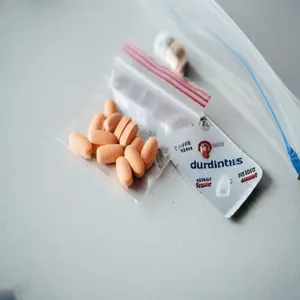
travel medication
- Pills and Solids: Ibuprofen in pill, tablet, or capsule form is allowed in both carry-on and checked baggage without any specific quantity restrictions.
- Liquids: Liquid ibuprofen (e.g., children’s liquid suspensions) is subject to the 3-1-1 rule if carried on. This means each liquid container must be 3.4 ounces (100 milliliters) or less, and all containers must fit in a single, quart-sized, clear plastic zip-top bag.
- Documentation: While not always required, it’s always a good idea to have a prescription or doctor’s note for any medications, especially if they are prescription-only or in liquid form. This can help clarify any questions that might arise during security screening.
Ibuprofen: Carry-On vs. Checked Baggage
You can carry ibuprofen in both your carry-on and checked baggage. However, there are advantages and disadvantages to each option.
Carry-On Baggage
Carrying ibuprofen in your carry-on bag ensures that you have immediate access to it during your flight. This is especially useful if you’re prone to headaches or other pain that might arise while traveling. Furthermore, if your checked baggage gets delayed or lost, you’ll still have your medication with you.
Pros of carrying ibuprofen in your carry-on:
- Immediate access during the flight.
- Protection against lost or delayed checked baggage.
- Convenience for managing unexpected pain or discomfort.
Cons of carrying ibuprofen in your carry-on:
- Liquid forms are subject to the 3-1-1 rule.
- You must remember to remove the clear plastic bag for inspection during security screening.
Checked Baggage
Placing ibuprofen in your checked baggage can be convenient if you want to minimize the items you’re carrying through the airport. This is especially helpful for longer trips where you might be bringing larger quantities of medication.
Pros of carrying ibuprofen in your checked baggage:
- No restrictions on the quantity of pills or solid forms.
- No need to worry about the 3-1-1 rule for liquids (within reasonable personal use amounts).
- Frees up space in your carry-on bag.
Cons of carrying ibuprofen in your checked baggage:
- Medication is not readily accessible during the flight.
- Risk of medication being delayed or lost if your baggage is mishandled.
- Potential exposure to temperature fluctuations, although ibuprofen is generally stable.
The 3-1-1 Rule for Liquid Medications
The TSA’s 3-1-1 rule is a crucial guideline to understand when traveling with liquids in your carry-on baggage. This rule applies to all liquids, including liquid medications like liquid ibuprofen for children.
The 3-1-1 Rule Explained:
- 3.4 ounces (100 milliliters): Each liquid container must be 3.4 ounces (100 milliliters) or less.
- 1 quart-sized bag: All liquid containers must fit into a single, quart-sized, clear plastic zip-top bag.
- 1 bag per passenger: Each passenger is limited to one quart-sized bag of liquids.
While the 3-1-1 rule generally applies to liquids, there are exceptions for medically necessary liquids, including liquid medications. According to the TSA, you can bring larger amounts of medically necessary liquids, gels, and aerosols in your carry-on baggage. However, you must declare these items to a TSA officer at the security checkpoint. It is advisable to have documentation, such as a prescription or doctor’s note, to support the medical necessity of the liquid. TSA officers may require additional screening of the liquid.
Here’s a table summarizing the key differences:
| Medication Form | Carry-On Rules | Checked Baggage Rules | Documentation Recommended? |
|---|---|---|---|
| Pills/Tablets | Allowed in any quantity | Allowed in any quantity | Not typically required |
| Liquids (3.4 oz or less) | Allowed if it fits in a quart-sized bag with other liquids | Allowed in any quantity | Not typically required |
| Liquids (Over 3.4 oz – Medically Necessary) | Allowed, but must be declared to TSA officer. May require additional screening. Documentation recommended. | Allowed in any quantity | Yes, strongly recommended |
Packing Ibuprofen for Your Flight: Practical Tips
Now that you understand the TSA regulations, let’s dive into some practical tips for packing ibuprofen for your flight to ensure a hassle-free experience.
Proper Packaging
Regardless of whether you’re packing ibuprofen in your carry-on or checked baggage, proper packaging is essential.
- Original Packaging: Whenever possible, keep ibuprofen in its original packaging. This makes it easy for TSA officers to identify the medication and confirm that it’s an over-the-counter product.
- Secure Containers: Ensure that pills or tablets are stored in secure containers to prevent them from spilling or getting crushed. Pill organizers can be useful for managing multiple medications.
- Leak-Proof Bottles: If you’re carrying liquid ibuprofen, use leak-proof bottles to prevent spills that could damage your other belongings. Double-bagging the liquid in a zip-top bag is also a good idea.
Labeling
While not mandatory for over-the-counter medications, labeling your ibuprofen can be helpful, especially if you’re carrying it in a pill organizer or unmarked container.
- Clearly Label: Use a permanent marker to clearly label the container with the name of the medication (“Ibuprofen”) and the dosage.
- Include Instructions: If you have specific instructions for taking the medication (e.g., “Take with food”), include those instructions on the label as well.
Documentation: When is it Needed?
While not always required for over-the-counter medications like ibuprofen, having documentation can be beneficial in certain situations.
- Large Quantities: If you’re carrying a very large quantity of ibuprofen (e.g., for an extended trip), a doctor’s note or prescription can help explain the need for the medication.
- Liquid Medications: If you’re carrying liquid ibuprofen in quantities exceeding the 3-1-1 rule due to medical necessity, a doctor’s note is highly recommended.
- International Travel: When traveling internationally, documentation is even more important, as customs officials may have stricter regulations regarding medications.
A doctor’s note should include:
- Your name and date of birth.
- The name of the medication (ibuprofen).
- The dosage and frequency of use.
- A statement explaining the medical necessity of the medication.
- The doctor’s name, contact information, and signature.
Real-World Example: The Family Vacation
Imagine a family of four heading to Disney World. They know that long days of walking and standing in lines can lead to aches and pains, so they want to bring ibuprofen for both the adults and the children. They decide to pack the adult ibuprofen tablets in their carry-on bag for easy access, while the children’s liquid ibuprofen suspension goes into the checked baggage to avoid 3-1-1 rule complications. They also bring a doctor’s note for the children’s ibuprofen, just in case. This proactive approach ensures they’re prepared for any discomfort without running into issues at security.
Navigating Security Checkpoints with Ibuprofen
Knowing what to expect at security checkpoints can significantly reduce your stress levels and help you breeze through the screening process.
What to Expect at Security
When you reach the security checkpoint, be prepared to remove your shoes, belt, and any items containing metal. You’ll also need to remove your carry-on bag from the overhead bin and place it on the conveyor belt for X-ray screening.
If you have medications in your carry-on, you may want to separate them from your other belongings for easier inspection. This is especially true for liquid medications that exceed the 3-1-1 rule.
Declaring Medications to TSA Officers
If you’re carrying liquid medications in quantities exceeding the 3-1-1 rule or if you have any concerns about your medications, it’s always a good idea to declare them to a TSA officer. This allows them to inspect the medications and ask any necessary questions.
To declare your medications, simply inform the TSA officer that you have medically necessary liquids or medications that need to be inspected. Be prepared to show them your doctor’s note or prescription, if you have one.
Potential Scenarios and How to Handle Them
Here are a few potential scenarios you might encounter at a security checkpoint and how to handle them:
- Scenario 1: The TSA officer questions the quantity of ibuprofen you’re carrying.
- Solution: Explain that it’s for personal use during your trip. If you have a doctor’s note, show it to the officer.
- Scenario 2: The TSA officer asks you to open a container of pills for inspection.
- Solution: Cooperate with the officer and allow them to inspect the pills. If the pills are not in their original packaging, explain what they are and why you’re carrying them.
- Scenario 3: The TSA officer is unsure about the liquid ibuprofen you’re carrying.
- Solution: Explain that it’s a medically necessary liquid and show your doctor’s note. Be prepared for additional screening of the liquid.
Tips for a Smooth Security Experience
- Arrive Early: Give yourself plenty of time to get through security, especially during peak travel times.
- Be Organized: Pack your medications in an easily accessible location in your carry-on bag.
- Be Prepared: Have your doctor’s note or prescription readily available if you’re carrying liquid medications in excess of the 3-1-1 rule.
- Be Polite and Cooperative: Treat TSA officers with respect and cooperate with their instructions.
Traveling Internationally with Ibuprofen
When traveling internationally with ibuprofen, it’s important to be aware of the regulations of your destination country, as they may differ from those of the United States.
Researching Destination Country Regulations
Before you travel, research the medication regulations of your destination country. You can typically find this information on the website of the country’s embassy or consulate.
Some countries may have restrictions on the types or quantities of medications you can bring into the country. Others may require you to have a prescription or doctor’s note, even for over-the-counter medications like ibuprofen.
Obtaining Necessary Documentation
When traveling internationally with ibuprofen, it’s always a good idea to have the following documentation:
- Prescription or Doctor’s Note: A prescription or doctor’s note can help explain the need for the medication and can be useful if you encounter any questions from customs officials.
- Copy of Your Passport: A copy of your passport can help verify your identity and citizenship.
- List of Medications: A list of all the medications you’re taking, including the generic and brand names, dosages, and frequencies, can be helpful for customs officials and healthcare providers.
Tips for International Travel with Ibuprofen
- Pack in Original Packaging: Keep ibuprofen in its original packaging, with the labels clearly visible.
- Declare Medications: Declare all medications to customs officials upon arrival in your destination country.
- Store Medications Properly: Store medications in a cool, dry place and protect them from extreme temperatures.
- Carry a Sufficient Supply: Bring enough ibuprofen to last for the duration of your trip, plus a few extra days in case of delays.
- Learn Local Language: Learn how to say “ibuprofen” and “pain relief” in the local language of your destination country.
Real-World Example: The European Adventure
A couple is planning a backpacking trip through Europe. They both regularly take ibuprofen for minor aches and pains. Before they leave, they research the medication regulations of each country they plan to visit. They discover that some countries require a doctor’s note for even over-the-counter medications. To be safe, they both obtain doctor’s notes stating their need for ibuprofen. They also pack the ibuprofen in its original packaging and declare it to customs officials upon arrival in each country. This thorough preparation ensures they can enjoy their adventure without worrying about medication issues.
Alternatives to Ibuprofen for Travel
While ibuprofen is a popular and effective pain reliever, there are alternative options you might consider for travel, especially if you have allergies, sensitivities, or concerns about potential side effects.
Other Over-the-Counter Pain Relievers
- Acetaminophen (Tylenol): Acetaminophen is another common over-the-counter pain reliever that can be effective for headaches, muscle aches, and fever. It works differently than ibuprofen and is generally considered safe for people who cannot take NSAIDs (nonsteroidal anti-inflammatory drugs) like ibuprofen.
- Naproxen (Aleve): Naproxen is another NSAID that can provide longer-lasting pain relief than ibuprofen. However, it may also have a higher risk of side effects.
- Aspirin: Aspirin is an NSAID that can be used for pain relief, fever reduction, and anti-inflammatory purposes. However, it’s not recommended for children or teenagers due to the risk of Reye’s syndrome.
Non-Medication Alternatives
- Heat or Cold Packs: Heat or cold packs can be effective for relieving muscle aches and pains. Consider bringing a travel-sized heat pack or cold pack with you.
- Stretching and Exercise: Regular stretching and exercise can help prevent muscle stiffness and pain during travel.
- Hydration: Staying hydrated can help prevent headaches and muscle cramps.
- Rest and Relaxation: Getting enough rest and relaxation can help reduce stress and tension, which can contribute to pain.
- Acupressure: Acupressure is a traditional Chinese medicine technique that involves applying pressure to specific points on the body to relieve pain.
Consulting with a Healthcare Professional
If you have any concerns about taking ibuprofen or other pain relievers, it’s always a good idea to consult with a healthcare professional. They can help you determine the best pain relief options for your individual needs and medical history.
A healthcare professional can also provide you with a prescription for stronger pain relievers if necessary.
Current Trends and Statistics in Travel Medications (2024)
Staying informed about current trends and statistics in travel medications can provide valuable insights into how people are managing their health while on the go.
Increase in Travel Health Awareness
There’s a growing trend of increased travel health awareness among travelers. People are becoming more proactive about protecting their health while traveling, including packing necessary medications and taking preventive measures against illness.
According to a recent survey, 75% of travelers now pack a first-aid kit with essential medications, compared to 60% just five years ago.
Rise in Demand for Over-the-Counter Medications
The demand for over-the-counter medications like ibuprofen is on the rise, particularly among travelers. This is due to factors such as increased travel frequency, longer trips, and a desire to be prepared for unexpected health issues.
The global over-the-counter (OTC) drugs market is projected to reach $220 billion by 2024, driven by the increasing demand from travelers and health-conscious consumers.
Growth of Telemedicine and Online Pharmacies
Telemedicine and online pharmacies are becoming increasingly popular for travelers who need to access medications or medical advice while on the go. These services offer convenient and affordable options for obtaining prescriptions, refills, and consultations with healthcare professionals.
The telemedicine market is expected to grow at a rate of 20% per year over the next five years, fueled by the increasing adoption of digital health technologies and the growing demand for remote healthcare services.
Impact of COVID-19 on Travel Medication Practices
The COVID-19 pandemic has significantly impacted travel medication practices. Travelers are now more likely to pack medications for treating symptoms such as fever, cough, and sore throat, as well as preventive measures such as hand sanitizer and face masks.
A recent study found that 80% of travelers now pack COVID-19 related supplies in their carry-on bags, including thermometers, pulse oximeters, and antiviral medications.
Common Misconceptions About Bringing Ibuprofen on a Plane
There are several common misconceptions about bringing ibuprofen on a plane that can cause unnecessary anxiety and confusion. Let’s debunk some of these myths.
Myth 1: You Can’t Bring Any Medications on a Plane
Reality: This is completely false. The TSA allows passengers to bring both prescription and over-the-counter medications on a plane, in both carry-on and checked baggage. The only restrictions apply to liquid medications in carry-on baggage, which are subject to the 3-1-1 rule.
Myth 2: You Need a Prescription for All Medications
Reality: You only need a prescription for prescription medications. Over-the-counter medications like ibuprofen do not require a prescription for travel, although having a doctor’s note can be helpful in certain situations, such as when traveling internationally or carrying large quantities.
Myth 3: Liquid Medications Are Always Prohibited
Reality: Liquid medications are allowed in carry-on baggage if they comply with the 3-1-1 rule (3.4 ounces or less, in a quart-sized bag). Larger quantities of medically necessary liquids are also permitted, but you must declare them to a TSA officer and may be subject to additional screening.
Myth 4: You Can’t Bring Pills That Aren’t in Their Original Packaging
Reality: While it’s always best to keep medications in their original packaging, it’s not always possible or practical. If you’re carrying pills in a pill organizer or unmarked container, be sure to clearly label the container with the name of the medication and the dosage. It’s also a good idea to have a list of your medications with you.
Myth 5: TSA Officers Will Confiscate Your Medications
Reality: TSA officers are not looking to confiscate your medications. Their primary goal is to ensure the safety and security of passengers and the transportation system. As long as you comply with the TSA’s regulations and are honest and cooperative, you should not have any issues with your medications.
Ibuprofen Dosage and Safety Considerations for Travel
While bringing ibuprofen on a plane is generally permitted, it’s crucial to understand the proper dosage and safety considerations to ensure you’re using it responsibly.
Recommended Dosage
The recommended dosage of ibuprofen varies depending on the age and weight of the individual, as well as the condition being treated. Always follow the instructions on the product label or as directed by your healthcare provider.
For adults: The typical dose of ibuprofen for pain relief is 200-400 mg every 4-6 hours as needed. Do not exceed 1200 mg in a 24-hour period.
For children: The dosage of ibuprofen for children is based on weight. Consult with your pediatrician or pharmacist to determine the appropriate dose for your child.
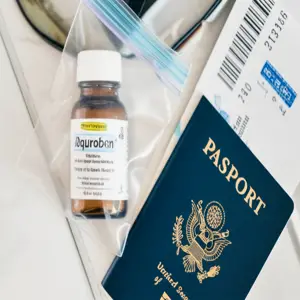
carry-on ibuprofen
Potential Side Effects
Ibuprofen can cause side effects, especially when taken in high doses or for extended periods of time. Common side effects include:
- Stomach upset, heartburn, nausea, vomiting
- Dizziness, headache
- Fluid retention, swelling
- Increased risk of bleeding
Serious side effects are rare but can include:
- Stomach ulcers, bleeding
- Kidney damage
- Liver damage
- Increased risk of heart attack or stroke
- Allergic reactions
Who Should Avoid Ibuprofen?
Ibuprofen is not suitable for everyone. You should avoid ibuprofen if you:
- Are allergic to ibuprofen or other NSAIDs
- Have a history of stomach ulcers or bleeding
- Have kidney or liver disease
- Have heart disease or high blood pressure
- Are pregnant or breastfeeding
- Are taking certain medications, such as blood thinners or aspirin
Precautions and Interactions
Before taking ibuprofen, inform your healthcare provider about any other medications you’re taking, as ibuprofen can interact with certain drugs, such as:
- Blood thinners (e.g., warfarin, aspirin)
- ACE inhibitors (e.g., lisinopril, enalapril)
- Diuretics (e.g., furosemide, hydrochlorothiazide)
- Antidepressants (e.g., SSRIs, SNRIs)
Also, be aware that alcohol can increase the risk of stomach upset and bleeding when taken with ibuprofen.
Tips for Safe Ibuprofen Use While Traveling
- Follow the recommended dosage instructions.
- Take ibuprofen with food to reduce the risk of stomach upset.
- Avoid taking ibuprofen for prolonged periods of time.
- Stay hydrated by drinking plenty of water.
- Be aware of potential side effects and interactions.
- Consult with a healthcare professional if you have any concerns.
Resources for Travelers with Medications
There are several valuable resources available to travelers with medications that can provide helpful information and support.
TSA Website
The TSA website (www.tsa.gov) is the best source of information on the latest security regulations and guidelines, including those related to medications. You can find detailed information on what items are allowed in carry-on and checked baggage, as well as tips for navigating security checkpoints.
U.S. Department of State
The U.S. Department of State website (www.travel.state.gov) provides information on travel advisories, visa requirements, and other important information for U.S. citizens traveling abroad. You can also find information on medication regulations in specific countries.
CDC (Centers for Disease Control and Prevention)
The CDC website (www.cdc.gov) has a section on travelers’ health that will provide any current advisories or recommendations for you. It has information on required vaccines, outbreaks, and any potential health threats in certain areas of the world.
International Association for Medical Assistance to Travelers (IAMAT)
IAMAT (www.iamat.org) is a non-profit organization that provides a directory of English-speaking doctors around the world. This can be invaluable if you need to seek medical attention while traveling.
Your Healthcare Provider
Your healthcare provider is a valuable resource for any questions or concerns you have about traveling with medications. They can provide you with personalized advice and recommendations based on your individual health needs.
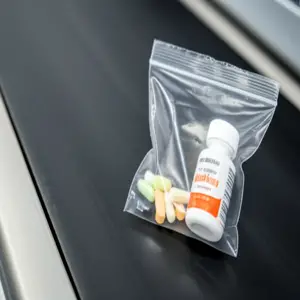
TSA guidelines
Pharmacist
Your pharmacist can offer advice and information about your medications, including potential side effects, interactions, and storage requirements. They can also help you find travel-sized versions of your medications.
FAQ: Your Questions About Bringing Ibuprofen on a Plane Answered
Let’s address some frequently asked questions about bringing ibuprofen on a plane.
Can I bring ibuprofen tablets in my carry-on baggage?
Yes, you can bring ibuprofen tablets in your carry-on baggage. There are no quantity restrictions for pills or solid forms of medication.
Is liquid ibuprofen allowed in my carry-on?
Liquid ibuprofen is allowed in your carry-on, but it must comply with the TSA’s 3-1-1 rule. Each container must be 3.4 ounces (100 milliliters) or less, and all containers must fit in a single, quart-sized, clear plastic zip-top bag.
Do I need a prescription to bring ibuprofen on a plane?
No, you do not need a prescription to bring ibuprofen on a plane, as it is an over-the-counter medication. However, having a doctor’s note can be helpful, especially when traveling internationally or carrying large quantities.
What if I need to bring a large quantity of liquid ibuprofen for medical reasons?
If you need to bring a large quantity of liquid ibuprofen for medical reasons, you can do so, but you must declare it to a TSA officer at the security checkpoint. It’s highly recommended to have a doctor’s note to support the medical necessity of the liquid.
Can I bring ibuprofen in my checked baggage?
Yes, you can bring ibuprofen in your checked baggage. There are no quantity restrictions for pills or solid forms. While there are technically no rules on the quantity of liquid medication in checked baggage, it is advisable to keep it reasonable for personal use.
What happens if I forget to declare my medications to a TSA officer?
If you forget to declare your medications, it’s not necessarily a problem. However, if the TSA officer discovers the medications during the screening process, they may ask you questions about them. It’s always best to be upfront and honest about any medications you’re carrying.
Can I use a pill organizer to carry my ibuprofen?
Yes, you can use a pill organizer to carry your ibuprofen. However, it’s a good idea to label the pill organizer with the name of the medication and the dosage. This can help avoid confusion during the security screening process.
Are there any countries where ibuprofen is banned?
While ibuprofen is generally available worldwide, some countries may have restrictions on the types or quantities of medications you can bring into the country. It’s always best to research the medication regulations of your destination country before you travel.
What should I do if I run out of ibuprofen while traveling?
If you run out of ibuprofen while traveling, you can usually purchase it at a local pharmacy. In some countries, you may need a prescription to purchase ibuprofen. If you have any difficulty obtaining ibuprofen, consult with a healthcare provider or contact your embassy or consulate for assistance.
Conclusion: Final Thoughts on Traveling with Ibuprofen
In conclusion, bringing ibuprofen on a plane is generally permissible and straightforward, provided you adhere to the TSA’s guidelines and exercise common sense. Whether you opt to pack it in your carry-on for immediate access or stow it away in your checked baggage for convenience, understanding the regulations surrounding liquid medications and proper documentation is key to a seamless travel experience.
As we’ve explored, there are numerous factors to consider, from researching destination country regulations to understanding potential side effects and interactions. By staying informed, preparing adequately, and consulting with healthcare professionals when necessary, you can ensure that you’re equipped to manage any pain or discomfort that may arise during your journey. Don’t forget to review the most recent TSA guidelines before traveling, as regulations are subject to change. The TSA website and other government resources can provide the latest updates to keep you informed and compliant.
Remember, traveling should be an enjoyable experience. By taking the necessary precautions and planning ahead, you can minimize stress and focus on creating lasting memories. So, pack your ibuprofen, gather your documents, and embark on your next adventure with confidence, knowing that you’re well-prepared to handle whatever comes your way. Always consider consulting with a healthcare professional if you have any concerns about traveling with medications. They can provide personalized advice based on your individual health needs. By following these guidelines, you can travel safely and comfortably, knowing that you’re prepared for any unexpected pain or discomfort along the way.
Whether it’s managing a persistent headache, easing muscle soreness after a long day of sightseeing, or simply having the peace of mind knowing relief is within reach, bringing ibuprofen on a plane can significantly enhance your travel comfort. Safe travels, and may your journey be filled with joy and well-being!

